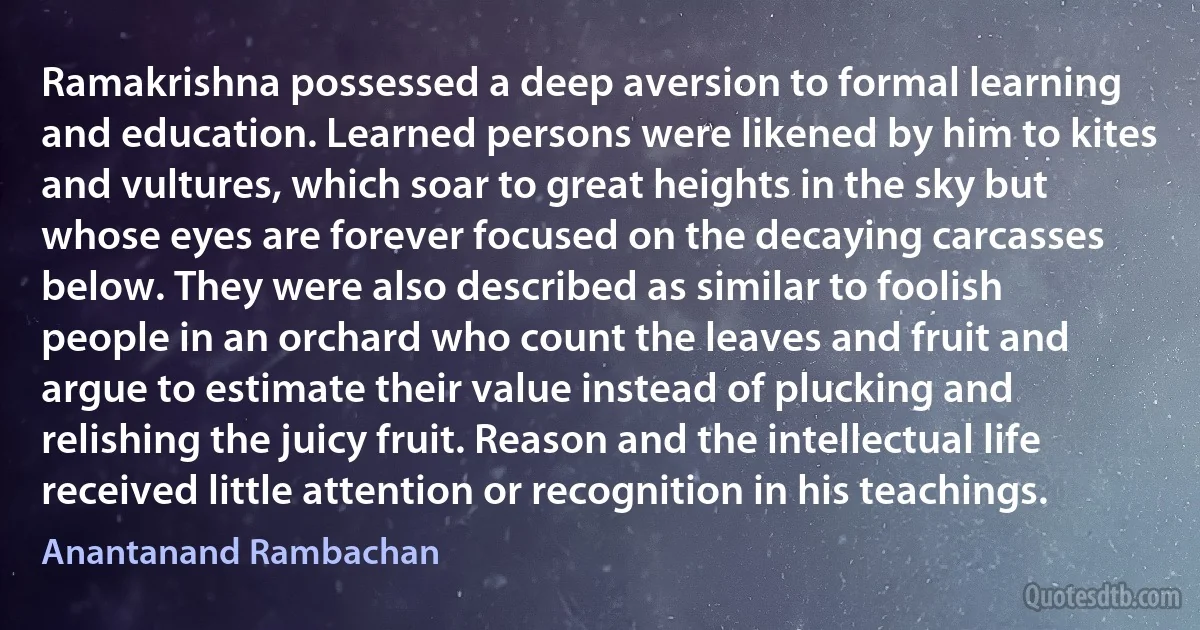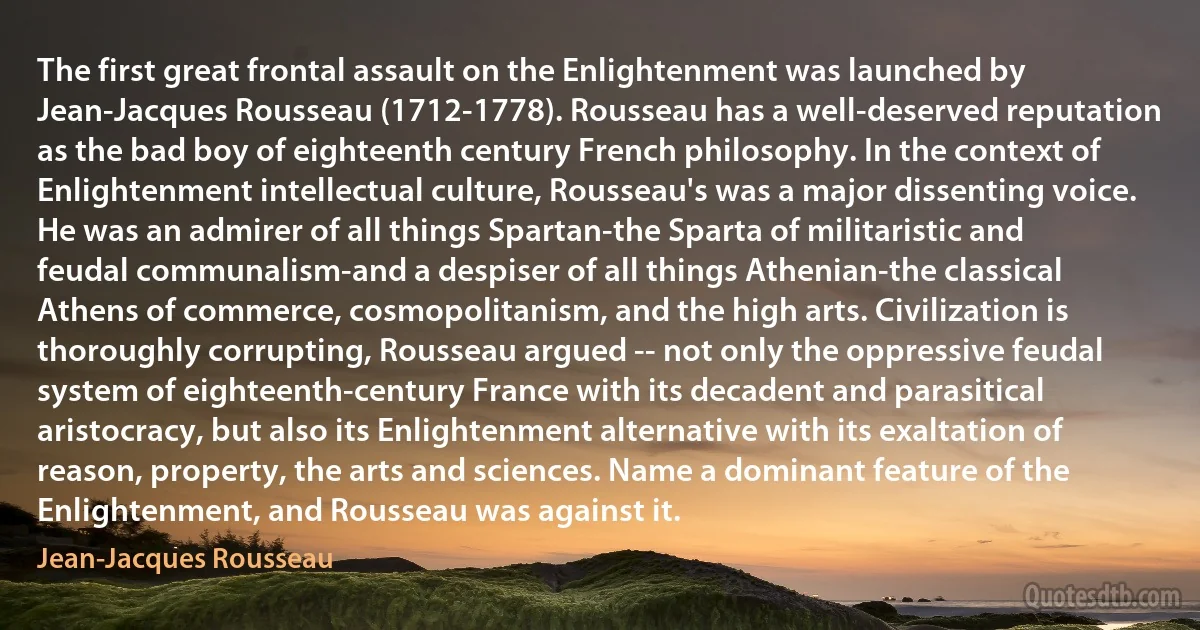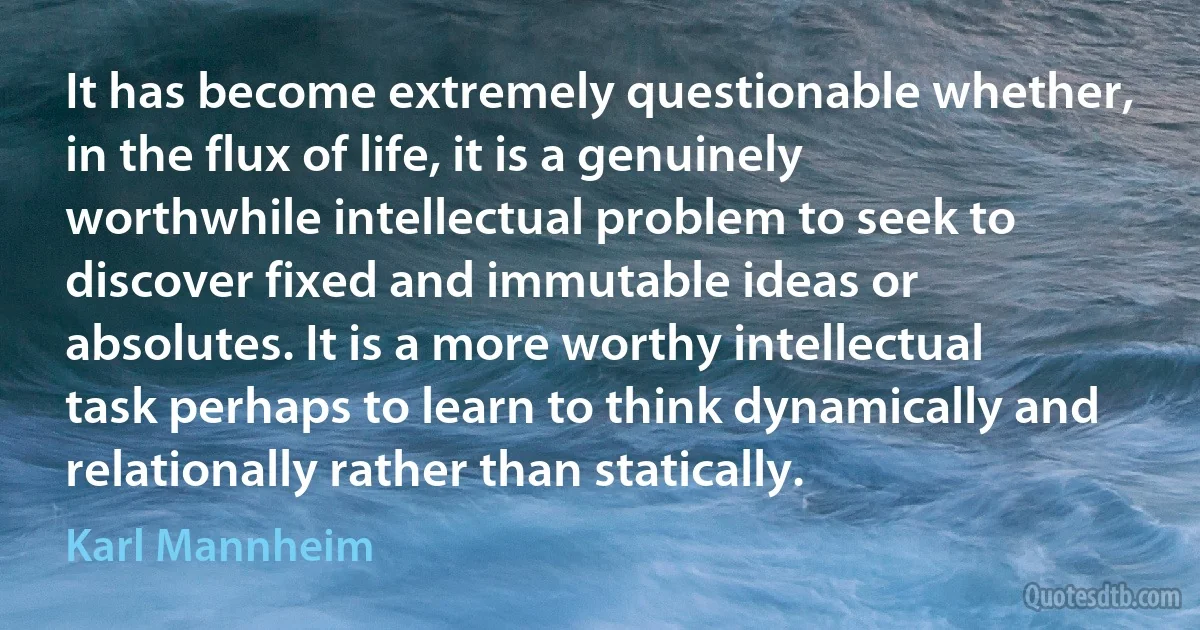Intellectual Quotes - page 80
The possession and the exercise of political, and among others of electoral, rights, is one of the chief instruments both of moral and of intellectual training for the popular mind; and all governments must be regarded as extremely imperfect, until every one who is required to obey the laws, has a voice, or the prospect of a voice, in their enactment and administration.

John Stuart Mill
The marks of former convulsions on every part of the surface of our planet are obvious and striking. The remains of marine animals imbedded in the solid strata are so abundant, that they may be expected to force themselves on the observation of every people who have made some progress in refinement; and especially where one class of men are expressly set apart from the rest for study and contemplation. ...Those modern writers, who are disposed to disparage the former intellectual advancement and civilization of eastern nations, might concede some foundation of observed facts for the curious theories now under consideration, without indulging in exaggerated opinions of the progress of science; especially as universal catastrophes of the world, and exterminations of organic beings, in the sense in which they were understood by the Brahmin, are untenable doctrines.

Charles Lyell
I'm terribly intuitive-I always thought I was intellectual about what I do, but I've come to the realisation that I have absolutely no idea what I'm doing half the time, that the majority of the stuff that I do is totally intuitive, totally about where I am physically and mentally at any moment in time and I have a far harder time than anybody else explaining it and analysing it. That's the territory of the artist anyway: to be quite at sea with what he does, and working towards not being intuive about it and being far more methodical and academic about it.

David Bowie
In his recent book, 'Welcome to the Desert of the Real', famed Slovenian socialist intellectual Slavoj Zizek tackles the Palestinian question in a most unoriginal manner. What concerns him most is not the foundational racism of Zionism and its concrete offspring, a racist Jewish state, nor the racist curricula of Israeli Jewish schools, the racist Israeli Jewish media representations of Palestinians, the racist declarations of Israeli Jewish leaders on the right and on the left, or the Jewish supremacist rights and privileges guiding Zionism and Israeli state laws and policies -- all of which seem of little concern to him -- but rather Arab 'anti-Semitism' which should not be 'tolerated'. Arabs are in fact reacting to Zionist Jewish colonialism and its commitment to European white supremacy in Jewish guise.

Joseph Massad
In the animal world we have seen that the vast majority of species live in societies, and that they find in association the best arms for the struggle for life: understood, of course, in its wide Darwinian sense - not as a struggle for the sheer means of existence, but as a struggle against all natural conditions unfavourable to the species. The animal species, in which individual struggle has been reduced to its narrowest limits, and the practice of mutual aid has attained the greatest development, are invariably the most numerous, the most prosperous, and the most open to further progress. The mutual protection which is obtained in this case, the possibility of attaining old age and of accumulating experience, the higher intellectual development, and the further growth of sociable habits, secure the maintenance of the species, its extension, and its further progressive evolution. The unsociable species, on the contrary, are doomed to decay.

Peter Kropotkin
Every great deed of which history tells us, every mighty passion which art can represent, every picture of manners, of civic arrangements, of the culture of peoples of distant lands or of remote times, seizes and interests us, even if there is no exact scientific connection among them. We continually find points of contact and comparison in our own conceptions and feelings; we get to know the hidden capacities and desires of the mind, which in the ordinary peaceful course of civilised life remain unawakened.
It is not to be denied that, in the natural sciences, this kind of interest is wanting. Each individual fact, taken by itself, can indeed arouse our curiosity or our astonishment, or be useful to us in its practical applications. But intellectual satisfaction we obtain only from a connection of the whole, just from its conformity with law.

Hermann von Helmholtz
Ceausescu substituted constructive action with frenzy. He went on a continuous rollercoaster, whistle-stop tour of the country. Once on this whirligig of official visits, speeches and congresses, he never got off it. The whirligig became faster and faster and more elaborate, with visits to foreign countries and a constant shuffling of ministers and ministries. It makes anyone who tries to follow it dizzy. It consumed his and everybody else's time; it wasted resources and achieved little. But inside Ceausescu's head frenzy equalled progress: it was an intellectual confusion to which, as time rolled on, the whole country was to succumb.

John Sweeney (journalist)
I was brought up in the Christian religion, and although I can scarcely sanction all the improper attempts to gain the emancipation of woman, all paganlike reminiscences also seem foolish to me. My brief and simple opinion is that woman is certainly as good as man-period. Any more discursive elaboration of the difference between the sexes or deliberation on which sex is superior is an idle intellectual occupation for loafers and bachelors.

Søren Kierkegaard
Nixon feared for our alliances if America abdicated in Indochina; he was concerned about the impact on Soviet restraint if the United States simply abandoned what four administrations had affirmed, and he believed that a demonstration of American weakness in Asia would destroy the opening to China based in part on America's role in thwarting Soviet moves toward hegemony in Asia. But as he entered office, he found that by the end of the Johnson administration, the goal of victory had been abandoned and a commitment had been made to end the bombing of North Vietnam and to seek a negotiated compromise solution. These objectives had been affirmed by both candidates in the presidential campaign. No significant American political or intellectual leader opposed them. When a negotiated solution proved unattainable, Nixon proceeded unilaterally to implement his concept of an honorable withdrawal.

Henry Kissinger
If I had to pick one year to represent the Fifties, I'd pick 1958. For one thing, it was the year that the folks at Wham-O, always looking for new ways to raise the level of American culture, gave us the Hula Hoop. This was a bright-colored plastic hoop that you spun around your hips using a hula-type motion. I realize that this sounds stupid, but you must trust me when I tell you, as one who participated extensively in this fad, that it really was stupid. In terms of intellectual content, the Hula Hoop made the Frisbee look like international championship chess.

Dave Barry
What I mean by "liberal"...is a moral rectitude and intellectual certainty claimed by a small but powerful sect of publicists and politicians on behalf of an arbitrary collection of policies, some of which are sensible and some bogus, but which in bulk are made offensive by the way in which they are presented.

Maurice Cowling
Shaw's emotional development was one with his intellectual strength. His path led him into the thick of the scrimmage, where more spontaneous natures defend themselves with the usual weapons of malice, humility, bad temper or conceit. But Shaw used the death ray of imperturbability. His feelings were never hurt, his envy never aroused, his conceit was a transparent fiction, he never quarreled.

Jacques Barzun
The book is one of the few attempts by an Indian intellectual to challenge seriously the assumptions and presuppositions of the field of India and/or South Asian studies tout ensemble, including not only the work of European and American scholarship but as well the neocolonialist, postmodernist and subaltern ressentiment so typical of contemporary Indian intellectuals... The book will be controversial on many different levels and will undoubtedly elicit rigorous critical response'.

Rajiv Malhotra
Veblen ... was a masterless, recalcitrant man, and if we must group him somewhere in the American scene, it is with those most recalcitrant Americans, the Wobblies. On the edges of the higher learning, Veblen tried to live like a Wobbly. It was a strange place for such an attempt. The Wobblies were not learned, but they were, like Veblen, masterless men, and the only non-middle class movement of revolt in twentieth-century America. With his acute discontent and shyness of program Veblen was a sort of intellectual Wobbly.

Thorstein Veblen
If in this book harsh words are spoken about some of the greatest among the intellectual leaders of mankind, my motive is not, I hope, the wish to belittle them. It springs rather from my conviction that, if our civilization is to survive, we must break with the habit of deference to great men. Great men may make great mistakes; and as the book tries to show, some of the greatest leaders of the past supported the perennial attack on freedom and reason. Their influence, too rarely challenged, continues to mislead those on whose defence civilization depends, and to divide them. The responsibility of this tragic and possibly fatal division becomes ours if we hesitate to be outspoken in our criticism of what admittedly is a part of our intellectual heritage. By reluctance to criticize some of it, we may help to destroy it all.

Karl Popper
Of pure American breed, of reckless health, his body perfect, free from taint from top to toe, free for ever from headache and dyspepsia, full-blooded, six feet high, a good feeder, never once using medicine, drinking water only-a swimmer in the river or bay or by the seashore- neck open, shirt collar flat and broad, countenance of swarthy transparent red, -face not refined or intellectual, but calm and wholesome-a face of an unaffected animal-a face that absorbs the sunshine and meets savage or gentleman on equal terms-a face of one who eats and drinks and is a brawny lover and embracer -a person singularly beloved and welcomed, especially by young men and mechanics- there you have Walt Whitman, the begetter of a new offspring out of literature...

Walt Whitman



